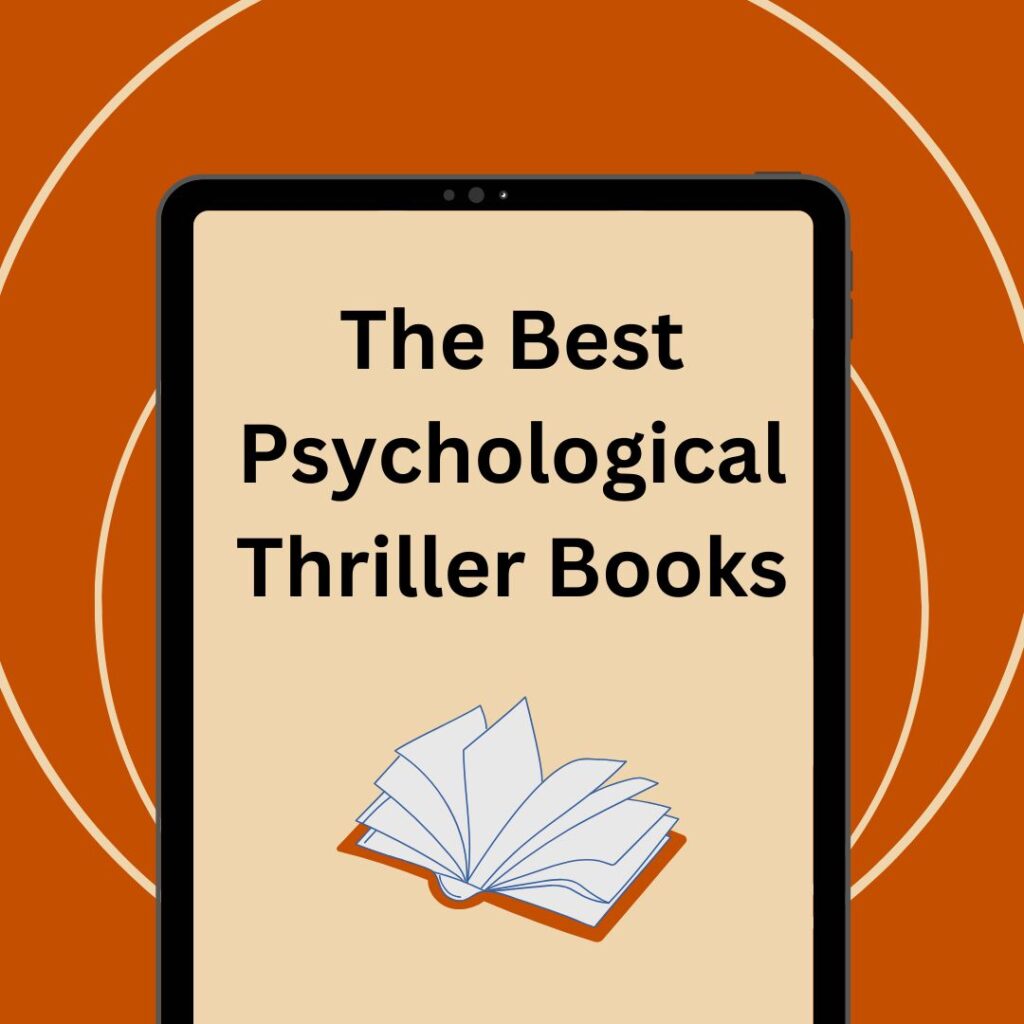The Best Psychological Thriller Books: A Deep Dive into Suspense
Psychological thrillers are a captivating genre that delves into the complexities of the human mind, exploring themes of obsession, manipulation, and the darker sides of human nature. This comprehensive guide presents some of the best psychological thriller books, each accompanied by a brief summary to help you choose your next gripping read. Prepare yourself for twists and turns that will keep you on the edge of your seat!

Table of Contents
1. The Silent Patient by Alex Michaelides
Alicia Berenson, a renowned artist, is convicted of murdering her husband and subsequently stops speaking. Her silence turns her into a media sensation and a subject of intrigue for psychotherapist Theo Faber, who becomes obsessed with uncovering her motives.
Key Themes:
- Unreliable Narrators: The story unfolds through different perspectives, keeping readers guessing.
- Psychological Depth: Explores themes of trauma, love, and betrayal.
- Twists and Turns: The shocking conclusion leaves readers questioning everything.
This debut novel has captivated audiences with its masterful storytelling and intricate plot.
2. Gone Girl by Gillian Flynn
On the morning of their fifth wedding anniversary, Nick Dunne reports his wife Amy missing. As the investigation unfolds, secrets about their marriage come to light, revealing a complex web of deceit and manipulation.
Key Themes:
- Media Influence: The story critiques how media shapes public perception.
- Marriage Dynamics: Explores the darker aspects of relationships.
- Dual Narratives: Alternating perspectives provide insight into both characters’ psyches.
Flynn’s sharp prose and intricate plotting make this a modern classic in psychological thrillers.
3. The Girl on the Train by Paula Hawkins
Rachel Watson takes the same train every day, observing the lives of others from her window. When she witnesses something shocking one day, she becomes embroiled in a mystery that forces her to confront her own troubled past.
Key Themes:
- Unreliable Narrator: Rachel’s alcoholism clouds her judgment and perception.
- Themes of Loss and Regret: The story delves into personal trauma and its effects on relationships.
- Interconnected Lives: The intertwining stories create suspense as secrets are revealed.
Hawkins’ gripping narrative keeps readers engaged until the final page.
4. The Woman in the Window by A.J. Finn
Dr. Anna Fox is an agoraphobic psychologist who spends her days watching her neighbors through her window. When she believes she witnesses a crime, no one takes her seriously, leading her to question her own sanity.
Key Themes:
- Isolation and Fear: Anna’s condition adds layers to her perception of reality.
- Psychological Manipulation: The narrative explores themes of trust and deception.
- Twists and Revelations: The plot is filled with unexpected turns that keep readers guessing.
This psychological thriller combines elements of suspense with deep character exploration.
5. Behind Closed Doors by B.A. Paris
Jack and Grace seem like the perfect couple, but behind closed doors lies a dark reality. Grace must navigate a life controlled by Jack while trying to find a way to escape his clutches.
Key Themes:
- Domestic Abuse: The novel sheds light on manipulation within relationships.
- Survival Instincts: Grace’s resilience showcases the strength needed to overcome adversity.
- Tension Building: The pacing builds suspense as readers root for Grace’s freedom.
Paris’ debut novel is both chilling and compelling, making it hard to put down.
6. My Sister, the Serial Killer by Oyinkan Braithwaite
Korede is a nurse whose beautiful sister Ayoola has a habit of killing her boyfriends. As Korede struggles with loyalty to her sister and moral dilemmas regarding Ayoola’s actions, things become complicated when Korede falls for someone who becomes Ayoola’s next target.
Key Themes:
- Dark Humor: Braithwaite blends comedy with horror effectively.
- Family Dynamics: Explores complex relationships between sisters.
- Moral Ambiguity: Questions what loyalty means in extreme circumstances.
This fast-paced thriller offers a fresh perspective on crime and morality.
7. The Good Daughter by Karin Slaughter
After a violent incident at their family home leaves two girls dead, the lives of sisters Charlie and Sam are irrevocably changed. Years later, Charlie must confront her past when another tragedy strikes.
Key Themes:
- Family Secrets: The story reveals how trauma impacts family dynamics over time.
- Resilience and Recovery: Explores themes of survival in the face of horror.
- Complex Characters: Slaughter dives deep into character psychology, making them relatable yet flawed.
This gripping tale showcases Slaughter’s talent for weaving suspense with emotional depth.
8. Strangers by C.L. Taylor
A group of strangers finds themselves entangled in a web of secrets after one member goes missing during a weekend getaway. As tensions rise, past traumas resurface, leading to shocking revelations.
Key Themes:
- Trust Issues: Explores how secrets can fracture relationships.
- Psychological Tension: Builds suspense through character interactions.
- Unpredictable Plot Twists: Keeps readers guessing until the very end.
Taylor’s skillful storytelling makes this an engaging read filled with tension.
9. The Wife Between Us by Greer Hendricks and Sarah Pekkanen
This psychological thriller explores the complexities of marriage through multiple perspectives. What appears to be a story about a jealous ex-wife quickly evolves into something much darker as secrets unfold.
Key Themes:
- Unreliable Narration: Layers of deception create intrigue.
- Marriage Dynamics: Examines themes of obsession and betrayal.
- Plot Twists Galore: Readers are kept on their toes as revelations change everything they thought they knew.
This novel is praised for its clever twists that challenge assumptions about love and marriage.
10. An Anonymous Girl by Greer Hendricks and Sarah Pekkanen
In this psychological thriller, Jessica Farris participates in a psychology study that leads her into an obsessive relationship with Dr. Lydia Shields, the enigmatic researcher behind it all. As Jessica becomes more involved in Lydia’s life, she discovers dark secrets that blur ethical lines between researcher and subject.
Key Themes
- Manipulation and Control: Explores power dynamics in relationships.
- Ethical Dilemmas: Raises questions about morality in psychological research.
- Suspenseful Plotting: Keeps readers engaged with unexpected twists at every turn.
This novel captivates readers with its exploration of obsession and ethical boundaries in human behavior.
Frequently Asked Questions (FAQs) About Psychological Thriller Books
1. What is a psychological thriller?
A psychological thriller is a subgenre of thriller fiction that focuses on the psychological states of its characters, often involving complex narratives that explore themes of obsession, manipulation, and the darker aspects of human nature. These stories typically create suspense through character-driven plots rather than relying solely on action or physical danger.
2. What are common themes in psychological thrillers?
Common themes include:
- Unreliable Narrators: Characters whose credibility is questionable, leading to twists and surprises.
- Obsession and Manipulation: Relationships characterized by control, deceit, and emotional turmoil.
- Mental Health Issues: Exploration of psychological disorders and their impact on behavior.
- Moral Ambiguity: Characters often operate in gray areas, challenging readers’ perceptions of right and wrong.
3. How do psychological thrillers differ from traditional thrillers?
While traditional thrillers often focus on external conflicts—such as crime or action—psychological thrillers delve deeper into the characters’ minds. They emphasize emotional and psychological tension, often leading to unexpected twists based on the characters’ motivations and internal struggles.
4. Are psychological thrillers suitable for all readers?
Psychological thrillers can contain mature themes, including violence, mental illness, and complex emotional situations. It’s important to check reviews or summaries to determine if a specific book aligns with your comfort level. Many books in this genre are intended for adult audiences.
5. Who are some popular authors in the psychological thriller genre?
Notable authors include:
- Gillian Flynn: Known for Gone Girl.
- Paula Hawkins: Author of The Girl on the Train.
- Alex Michaelides: Known for The Silent Patient.
- B.A. Paris: Author of Behind Closed Doors.
These authors have made significant contributions to the genre with their compelling narratives and complex characters.
6. How can I choose a good psychological thriller?
To find a compelling psychological thriller:
- Read Reviews: Check online reviews or ratings from trusted sources.
- Explore Recommendations: Look for lists of bestsellers or award-winning titles in the genre.
- Consider Your Preferences: Think about whether you prefer character-driven stories or intricate plots with multiple twists.
- Sample Chapters: Read excerpts to see if the writing style resonates with you.
7. Do psychological thrillers always have a twist ending?
While many psychological thrillers feature twist endings that challenge readers’ expectations, not all do. The effectiveness of a twist often depends on how well it aligns with character development and plot progression throughout the story.
8. Can I find diverse voices in psychological thrillers?
Yes! The genre has seen an increase in diverse voices exploring different cultural backgrounds and perspectives. Authors like Oyinkan Braithwaite (My Sister, the Serial Killer) and S.A. Cosby (Razorblade Tears) bring fresh narratives that enrich the genre.
9. Are there any adaptations of popular psychological thrillers?
Many psychological thrillers have been adapted into successful films and TV series. Some notable adaptations include:
- Gone Girl (Gillian Flynn)
- The Girl on the Train (Paula Hawkins)
- The Silent Patient (in development)
These adaptations often bring new audiences to the original works while providing fresh interpretations of beloved stories.
10. How have psychological thrillers evolved over time?
Psychological thrillers have evolved from classic works focusing on crime and suspense to contemporary narratives that explore deeper emotional and societal issues. Modern authors often incorporate elements of social commentary, mental health awareness, and complex character dynamics into their stories.
Conclusion
Psychological thrillers offer an exhilarating exploration into the human psyche, blending suspense with deep character studies. From The Silent Patient to My Sister, the Serial Killer, these books promise to keep you engaged with their intricate plots and unexpected twists. Whether you’re new to the genre or an avid fan, this list provides an array of options that will leave you breathless until the last page is turned. Dive into these captivating stories today—your next thrilling adventure awaits!
Discover marketing services, interviews & publishing tools at SharingStories.




